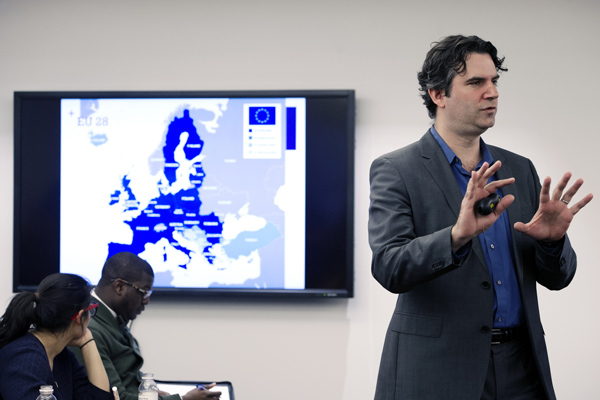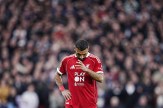The battle for Ukraine

The turmoil in Ukraine could lead to two very different versions of Europe, according to Mitchell Orenstein, chair of Northeastern University’s Department of Political Science. Europe can either continue its expansion as a zone of peace and prosperity, or revert back to a two-block landscape.
Orenstein’s lecture on Wednesday morning at Renaissance Park was the fourth in the Department of Political Science and Northeastern’s Humanities Center’s series Controversial Issues in Security Studies. Titled “The Battle for Ukraine,” his talk focused on the events leading up to the uproar there and what it means from a geopolitical standpoint.
“Ukraine is obviously the geopolitical pivot point in Europe,” said Orenstein, a scholar of international politics whose expertise includes a focus on the political economy of transition in Central and Eastern Europe. “So what we have now is a choice between a ‘whole and free’ Europe or a two-block Europe with varying influences. And then what are the boundaries of those two blocks?”
Orenstein added it’s difficult to know how to respond to those two different projects, which could likely result in a second Cold War.
Turmoil began in Ukraine late last year when former President Viktor Yanukovych opted against signing an association agreement with the European Union in favor of stronger ties with Russia. Violent riots broke out after that announcement, resulting in more than 100 deaths and Yanukovych’s eventual ouster.
In the aftermath of Yanukovych being overthrown, Russia took control of the Crimean Peninsula, a multi-ethic region that declared independence from Ukraine earlier this month. The Russian government said it has intervened in the region to help protect Russian civilians and military personnel in Crimea.
The U.S. and Europe responded with sanctions against certain Russian and Ukrainian officials and voting Russia out of the G8. Orenstein said the next round of sanctions could be an embargo against Russian gas or even cutting off Russia’s links to western banking systems.
“The question is do we pull the trigger,” Orenstein said of greater U.S. sanctions. “And we don’t know that yet. Right now (President Barack) Obama has connected the trigger to an invasion of Ukraine.”
When asked about the U.S.’s involvement with Ukraine, Orenstein said U.S. foreign policy “maddeningly” did not pay enough attention to Ukraine and it’s importance on a geopolitical scale. “It’s an interesting story we are a part of now,” Orenstein said. “It’s a rather dangerous time in Europe and a concerning time for the west in general.”
Orenstein said he hopes to visit Ukraine to see the build up to the May elections called after Yanukovych’s ouster.





